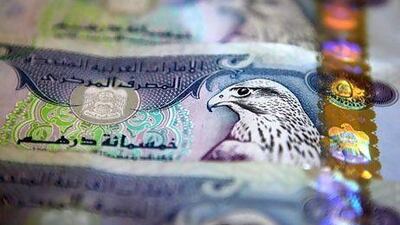Public sector spending and lending in the UAE will drop by US$5.6 billion (Dh20.57bn) this year, projects the IMF, as the government scales back its budget.
Abu Dhabi and Dubai were both looking to roll back spending, said the fund.
"Both Abu Dhabi and Dubai plan to balance their fiscal budgets accounts in the medium term," wrote the IMF in a statement concluding a visit to the country last month.
"With the increase in development spending more than offset by other savings, Abu Dhabi's planned gradual fiscal consolidation appears appropriate."
Government spending is one of the key pillars of economic growth, helping to support demand within the economy. The IMF projects economic growth to fall back to 2.3 per cent this year, from 4.9 per cent last year.
Based on estimated nominal GDP, total expenditure and net lending across federal and emirate budgets would be $103.8bn this year, down from $109.44bn last year, according to The National's calculations using the IMF statement. The spending slowdown follows a small dip in expenditure last year and comes after several years of expansionary budgets. During those heady years, the UAE rolled out ambitious projects ranging from its Formula one race track and Ferrari theme park in Abu Dhabi to the artificial, palm-shaped islands in Dubai.
But volatility in oil prices in recent years and Dubai's lingering debt woes have helped to curtail spending appetite. The break-even oil price, the level at which the Government can balance its budget, has risen from $23 in 2008 to $84 this year, the IMF estimates, exposing the UAE to the risk of falling oil prices.
In January, the Abu Dhabi Executive Council approved a raft of multibillion-dollar infrastructure plans, ranging from Abu Dhabi International Airport's Midfield Terminal project to 14 new healthcare facilities such as the Abu Dhabi Cleveland Clinic. In addition, as much as Dh3.4bn has been added to the federal budget through hikes in public sector pay, which took effect in January. But the spending increase would be more than offset by other savings, the IMF wrote in its statement.
Abu Dhabi planned a continued fiscal consolidation through 2017, the IMF said.
The emirate accounts for by far the biggest component of the consolidated budget across the UAE. Spending of other individual emirates and the federal Government also form part of the consolidated budget.
Dubai planned to bring its fiscal accounts close to balance by 2014, the IMF said.
"Dubai's continued fiscal consolidation is crucial for its medium-term sustainability given fiscal risks posed by contingent liabilities related to GREs [government-related entities]," it said.
The IMF's outlook for government spending this year is at odds with projections from some economists. Consolidated spending will rise to Dh385bn this year compared with Dh360bn last year, said Khatija Haque, a senior economist at Emirates NBD.
"We have based our forecast on a projection of an increase in capital and current spending this year," she said.
"We think a rise in spending is reasonable, especially when you take increases in oil prices and production into consideration."

